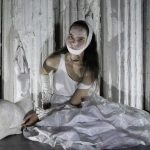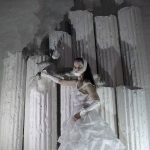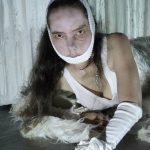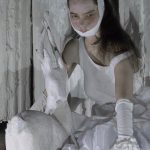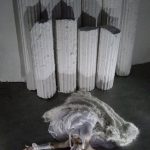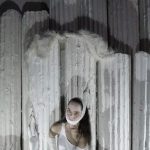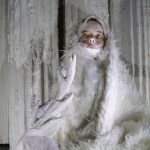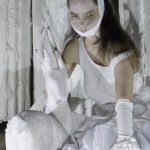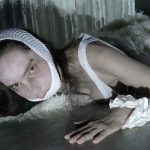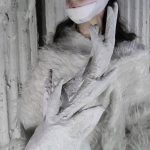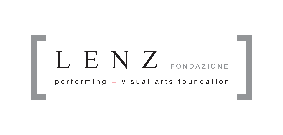
IPHIGENIA IN TAURIDE
IPHIGENIA
2018-2019 Biennial Project
scenic musical Diptych on the sacrifice of the innocent females
2018 IPHIGENIA IN AULIS
Ah! quʼil est doux, mais quʼil est difficile (Ah! Sweet, yet how difficult it is) from Euripides and Gluck
from Euripides and Gluck < M.F. Maestri and F. Pititto Creation
2019 IPHIGENIA IN TAURIS
Ich bin stumm
(I am mute)
from Goethe and Gluck < M.F. Maestri and F. Pititto Creation
in collaboration with “A. Boito” Music Conservatory
2019 from March 22 to 30
march 22 h 21 PREMIÈRE
march 23 h 18
march 25, 26, 27, 28, 29, 30 h 21
Lenz Theatre – Majakovskij Room – 2019 Habitat Pubblico
In this new creative process – second chapter of the diptych dedicated to the myth of Iphigenia – the scenic installation and the direction by Maria Federica Maestri as well as the imagery by Francesco Pititto are inspired by Joseph Beuys’s historic action Titus-Iphigenia of 1969.
On the organic, dense and metamorphic altar – in a state of real material decomposition – no sacrifice will be made, no victim will be immolated, but we will witness Iphigenia’s animal rebirth and her return to a new nature-homeland, free from social and religious bonds.
Interpreting Iphigenia in Tauris. I am mute will be Monica Barone, a dancer whose performative sensitivity has matured in the relationship with her own physical specificity. Monica was born with a severe facial malformation, and, despite the numerous surgical operations she is often subjected to, this condition does not prevent her from cultivating and practicing with passion the languages of contemporary dance and photography.
She recently played the role of Beatrice in the large site-specific installation Paradise. A Sacred Piece. By Lenz (2017), and a young singer of the Arrigo Boito Conservatory of Parma will accompany her for the musical part of the homonymous work by Gluck.
In this new creative process – second chapter of the diptych dedicated to the myth of Iphigenia – the scenic installation and the direction by Maria Federica Maestri as well as the imagery by Francesco Pititto are inspired by Joseph Beuys’s historic action Titus-Iphigenia of 1969.
On the organic, dense and metamorphic altar – in a state of real material decomposition – no sacrifice will be made, no victim will be immolated, but we will witness Iphigenia’s animal rebirth and her return to a new nature-homeland, free from social and religious bonds.
Interpreting Iphigenia in Tauris. I am mute will be Monica Barone, a dancer whose performative sensitivity has matured in the relationship with her own physical specificity. Monica was born with a severe facial malformation, and, despite the numerous surgical operations she is often subjected to, this condition does not prevent her from cultivating and practicing with passion the languages of contemporary dance and photography.
She recently played the role of Beatrice in the large site-specific installation Paradise. A Sacred Piece. By Lenz (2017), and a young singer of the Arrigo Boito Conservatory of Parma will accompany her for the musical part of the homonymous work by Gluck.
Biographic notes
Lenz Foundation | Maria Federica Maestri and Francesco Pititto
The artistic history of Lenz Foundation is an incessant research on contemporary language.
In the first phase of their creative path, Maria Federica Maestri and Francesco Pititto crossed the fundamental dramaturgy of Western culture, transliterating the poetic impulses in contemporary actions.
In a more recent phase, the artists put visual and plastic research at the core of their poetic. The performing action is wedged between writing for images and plastic creation of space, which no longer holds scenic functional limits but tends to be a real artistic installation.
The density of the performing work is symmetrical to the intensity and exceptionality of the performers: not only actors, but also artistic reagents of the creative text.
References to monumental dramaturgical nuclei remain also in this recent phase.
Büchner, Hölderlin, Lenz, Kleist, Rilke, Dostoevskij, Majakovskij, Shakespeare, Goethe, Grimm, Andersen, Calderón de la Barca, Genet, Lorca, Bacchini, Ovidio, Virgilio, Manzoni, d’Annunzio, Ariosto, Dante, Euripide, Eschilo, Verdi, Gluck: these are the authors that marked Lenz’s monographic and long-standing projects, starting back in 1985.
The recent projects of contemporary creative performance are the artistic result of
visual, filmic, spatial, dramaturgical and sound research work.
In an aesthetic convergence between loyal interpretation of the script, visual radicality in filmic creation, and originality in conceptual extremism of the artistic installation, Lenz’s work rewrites the philosophical tensions and aesthetic unease of the contemporary into visionary languages.
Francesco Pititto owns the translation, dramaturgical rewriting, and dramatic treatment of images for Lenz’s works, and he also directs alongside Maria Federica Maestri. The scenery and costumes are designed by Maria Federica Maestri, noted by critics for her work on the “dramaturgy of the matter”, and for her system of visual signs that make up her very personal “design-acted”. Andrea Azzali, an experimental musician who focuses on electronic composition, is the creator of the original music. He is also a resident artist and teacher of sound design.
Monica Barone
She was born in Caracas (Venezuela) in 1972. She graduated from the Paolo Toschi Institute of Art in Parma (now Liceo d’Arte) and graduated from the Brera Academy of Fine Arts in Milan in 2006. She made her debut in Milan in 2000 as a visual artist at the Contemporary Art Fair, with a series of photographic images included in the solo exhibition Il Corno d’Argento by Luciano Inga Pin (2000). Subsequently, again on display in a solo exhibition part of the Artintype project, edited by Martintype graphic arts and made in collaboration with the Academy of Fine Arts of Brera. The same works were published in the Corriere della Sera, Photography, the force of nonconformity (October 2000) and in the magazine Ballettanz (Berlin, August-September 2004).
Monica started working with Laura Banfi and Nadia Pedrazzini on the performance project Sull’ammore (2012). She was performed in Lei (2012) and in various impromptu performances of contact improvisation (2013). She participated, as independent artist, in the ACT # 1 project (Rome Fashion Week, 2006). She collaborated with the C.I.M.D. (International Center of Movement and Dance) in the search for laboratories in schools (2010-11). Recently she participated in Paradiso. A Sacred Piece of Lenz Foundation, by Giuseppe Verdi and Dante Alighieri, site-specific installation, special commission of the Festival Verdi in Parma, directed by Maria Federica Maestri, dramaturgy and imagery by Francesco Pititto (2017).
Education. From 1988 to 1994 she studied dance-theatre with Lucia Perego, Thierry Parmentier, Michele Abbondanza, Antonella Bertoni, Roberto Castello, Giorgio Rossi, Larrio Ekson but above all, from 1998 to 2005, contact improvisation with Gabriela Morales, Jess Curtis, Lisa Nelson, Daniel Lephkoff and contact art with Laura Banfi, Nadia Pedrazzini, Roberto Lun.
Prelude to contact improvisation was the course of study with Luisa Casiraghi (1993-1996),
through which she learned a dance approach focused on the person-dancer considered in its physical-mental-emotional totality, together with a dynamic and fluid ground-work (D.S.T. Dinamic Stick Technique, dance technique with included elements of aikido).
The experience of natural movement continued in the contact improvisation and in the study of the languages derived from it, such as Danceability (improvised performance technique practiced by skilled and disabled people that she studied with Laura Banfi and Alito Alessi from 2001 to 2002). She later studied contemporary dance with Tino Schepis and, more recently, with Monica Bianchi. Since 2012 she has been practicing yoga and meditation with Nicoletta Ronconi.
IPHIGENIA IN TAURIDE
Ich bin stumm (I am mute)
from Johann Wolfgang Goethe and Christoph Willibald Gluck
Dramaturgy and imagery | Francesco Pititto
Theatrical scenery, direction, costumes | Maria Federica Maestri
Interpreters | Monica Barone and an opera singer from A. Boito Music Conservatory of Parma
Sound reworking | Andrea Azzali
Choreographic notation | Davide Rocchi
Technical manager | Alice Scartapacchio
Project manager | Elena Sorbi
Organization | Ilaria Stocchi, Loredana Scianna
Press office and communication | Michele Pascarella
Media press office | Stefano Cacciani
Assistant | Marco Cavellini
Production | Lenz Foundation
in collaboration with A. Boito Music Conservatory of Parma







